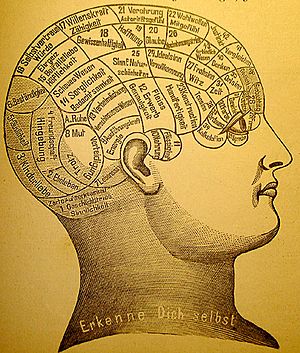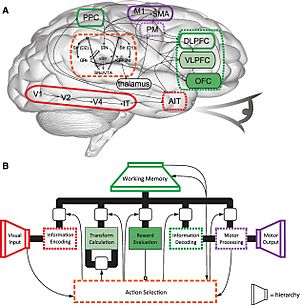Mind facts for kids
The mind is a general term for how a person thinks, reasons, understands, makes choices, and feels. For scientists, what we call the mind is completely linked to how our brain works. Some people, however, believe the mind is separate from the body, often calling it a soul. This idea is known as dualism.
Many people discuss what makes up the mind. Some say that only thinking and memory are part of the mind because we are aware of them. In this view, feelings like love, hate, fear, and joy are separate from the mind. They might even say emotions come from the heart. Others argue that our thoughts and feelings cannot be separated. They believe all of these are part of what we call the mind.
People often use the word mind to mean the same as thought. This is like when we talk to ourselves "inside our heads." This is why we say things like "make up our minds" or "change our minds." One important thing about the mind, in this way, is that it is private. No one else can truly "know our mind."
Contents
What is the Mind?
The word "mind" has changed its meaning over time. Long ago, in Old English, the word gemynd mostly meant memory. This is why we still say "call to mind" or "keep in mind." Over hundreds of years, the word "mind" grew to include all our conscious thoughts and feelings.
Exploring the Mind
Parts of the Mind
Our mind helps us understand the world and deal with it. Here are some key parts:
- Thought: This is how we use information. It includes forming ideas, solving problems, thinking things through, and making choices.
- Memory: This is our ability to store information in our minds. We can then remember it later when we need it.
- Imagination: This is the amazing ability to create new worlds or ideas inside our minds. We use our experiences from the real world to build these new thoughts.
- Consciousness: This is knowing that we exist and that the world around us exists. It means being aware and able to understand what is happening.
Mental Health
Just like our bodies, our minds can be healthy. This is called mental health. The World Health Organization (WHO) says there is no single way to measure mental health for everyone. This is because many things around us can affect what "mentally healthy" means for different people.
Most experts agree that not having a mental illness does not automatically mean you have good mental health. Good mental health means feeling capable and happy. It means being able to handle normal stress and recover from tough situations. It also means making and keeping friends, and living an independent life.
Mind and Philosophy
Philosophy of mind is a part of philosophy that studies what the mind is. It also looks at how the mind is connected to the body. The biggest question is how the mind and body work together.
- Dualism: This idea suggests that the mind and body are separate in some way. Famous thinkers like Plato and René Descartes believed in dualism. Descartes, in the 1600s, explained it very clearly.
- Monism: This belief says that the mind and body are not truly separate. They are part of the same thing. Baruch Spinoza, a philosopher from the 1600s, thought that mind and body are two different parts of a larger being.
Some philosophers called Idealists believe that only the mind truly exists. They think the outside world is created by our minds. Physicalists believe that everything, including the mind, can be explained by what is physical.
Mind and Psychology
Psychology is the scientific study of how we think, feel, and act. It looks at processes like perception, cognition (thinking), feelings, and personality. Psychologists also study how things around us affect our thoughts. From this study, they try to understand why we act the way we do. Psychology also uses this knowledge to help people with everyday problems and mental health issues.
Social Psychology
Social psychology studies how we think, feel, and act when we are in groups of other people. People who study social psychology are usually psychologists or sociologists. They look at how our minds are influenced by others and how we behave in social situations.
Mind's Eye
The phrase Mind's eye refers to our ability to "see" things in our imagination. It means we can picture things in our head, even if they are not physically in front of us.
Related pages
See also
 In Spanish: Mente para niños
In Spanish: Mente para niños
 | DeHart Hubbard |
 | Wilma Rudolph |
 | Jesse Owens |
 | Jackie Joyner-Kersee |
 | Major Taylor |



